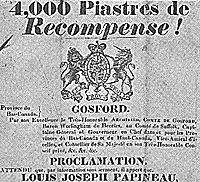|
Courtesy: National Archives of Canada Louis-Joseph Papineau was born October 7, 1786. In June 1808, he became member of the Assembly for Kent (Chambly). He was admitted to the Bar of Lower Canada on May 3, 1810. In 1814, he was elected in the county of Montreal East as a replacement for his father. He represented this county in the House of Assembly until March 1832. He was Speaker of the House of Assembly from 1815 to 1823 and from 1825 to 1832. With his forceful interventions in the House and his popularity as a powerful speaker, Louis-Joseph Papineau became the champion of the nationalist movement. As leader of the Canadian Party, which later became the Patriot Party,
he made an important speech in the House of Assembly on February 28, 1834,
on the Ninety-two Resolutions. London responded to these requests with
the Russell resolutions, which reached Canada three years later. Their
terms only swelled the discontent, and rebellion took shape. Armed uprisings
broke out.
When he returned to the colony, Papineau was granted amnesty thanks to the influence of Louis-Hippolyte La Fontaine. He was re-elected to the Parliament of United Canada in January 1848 as member for Saint-Maurice county. In 1852, he was elected member for Deux-Montagnes. Papineau retired from politics in 1854. He died September 23, 1871, at 85 years of age.
Copyright. The National Library of Canada. (Revised: 1996-11-19) |
